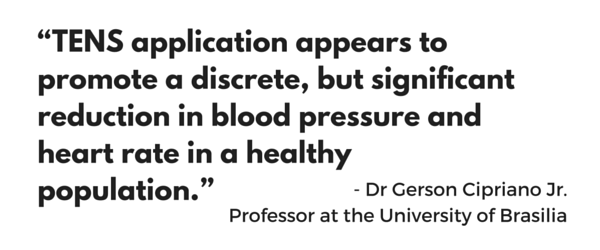Can PainPod TENS lower blood pressure or heart rate?
According to new research recently published, the TENS technology used by the PainPod could potentially help lower blood pressure and heart rate.
Is your blood pressure stressing you out? You are not alone. Between 2011 and 2012, hypertension (high blood pressure) affected almost one-third of all American adults. Lead study author Dr Gerson Cipriano Jr. and his team of internationally recognised professionals take a look at the facts surrounding the use of TENS for improved cardiovascular health.

The following article by PainPod covers information that may help you understand the research study and includes the results from the systematic review and meta-analysis.

Blood pressure and cardiovascular health
Every time the heart beats, it pumps blood through the body via blood vessels. As the blood flows, it exerts force against the vessel walls. It is these natural forces against the walls of the vessels that give us the blood pressure reading.
Blood pressure is a useful measure for cardiovascular health because it reveals a lot about how hard the heart is working.
What is a normal blood pressure reading?
Under 120/80 mm Hg
120 mm Hg represents the systolic blood pressure. This number is a measure of the pressure in the artery during a heartbeat. 80 mm Hg represents the diastolic blood pressure. This is the pressure in the artery between heart beats.
Let’s get technical: Research study breakdown
The researchers analysed a number of different resources involving a total of 142 healthy individuals. Dr Cipriano and colleagues found that when all the identified studies were combined, a statistically significant drop in diastolic blood pressure of 1.04 mm Hg (p = 0.04) and in heart rate of 2.55 beats per minute (p = 0.005) was found for healthy people using TENS. There was also an immediate reduction of 3.00 mm Hg in systolic blood pressure, but this was only significant for low frequency TENS.(1)
Is that a good result?
Although these reductions may not seem overly significant, the researchers noticed that these results are actually not that different to alternative intervention methods for lowering blood pressure. For example, regular aerobic exercise has been shown to reduce systolic and diastolic blood pressure by 3.84 mm Hg and 2.58 mm Hg respectively. Anti-hypertensive drugs achieve reductions of 5.7 mm Hg and 3.6 mm Hg.
Can TENS lower blood pressure or heart rate?
Dr Cipriano, Jr. concluded:
“These findings contribute to the hypothesis that TENS is beneficial for different cardiovascular conditions, such as hypertension, myocardial ischemia and heart failure. However, the use of TENS for hemodynamic control in patients with or without cardiovascular disease is not common.”
PainPod recommendations
Both PainPod’s TENS and EMS (NMES) frequencies have a number of different benefits for people. If you are a victim of high blood pressure, there are a number of ways you can help to restore balance to your cardiovascular health.
Here are a few suggestions:
- Avoid processed foods
- Commit to an exercise routine
- Smile more to lower your stress levels
- Keep an eye on your salt intake
- Quit smoking
By integrating a PainPod into your routine, you may be able to reduce your blood pressure more efficiently. If you are considering replacing your blood pressure medication with the PainPod, make sure you check in with your health professional first before doing so. Cutting back over time in combination with daily PainPod treatments could be the more appropriate option.
Contraindications for the PainPod medical devices
Do not use your PainPod:
- if you have a pacemaker or any kind of electronic implanted device
- if you have a cochlear implant hearing device
- if you have a severe heart disorder
- if you suffer from epilepsy
- if you already have DVT
If you are prone to seizures, have cancer or are recovering from cancer, consult with your doctor before use. Remember, the PainPod is an approved medical device and as such, should be used only as directed by the manual and user guide or by your healthcare professional.
- Campos FV, Neves LM, Da Silva VZ, Cipriano GF, Chiappa GR, Cahalin L, Arena R, Cipriano G. Hemodynamic Effects Induced by Transcutaneous Electrical Nerve Stimulation in Apparently Healthy Individuals: A Systematic Review With Meta-Analysis. Arch Phys Med Rehabil. 2015 Sep 15. pii: S0003-9993(15)01167-3. doi: 10.1016/j.apmr.2015.08.433. [Epub ahead of print]



